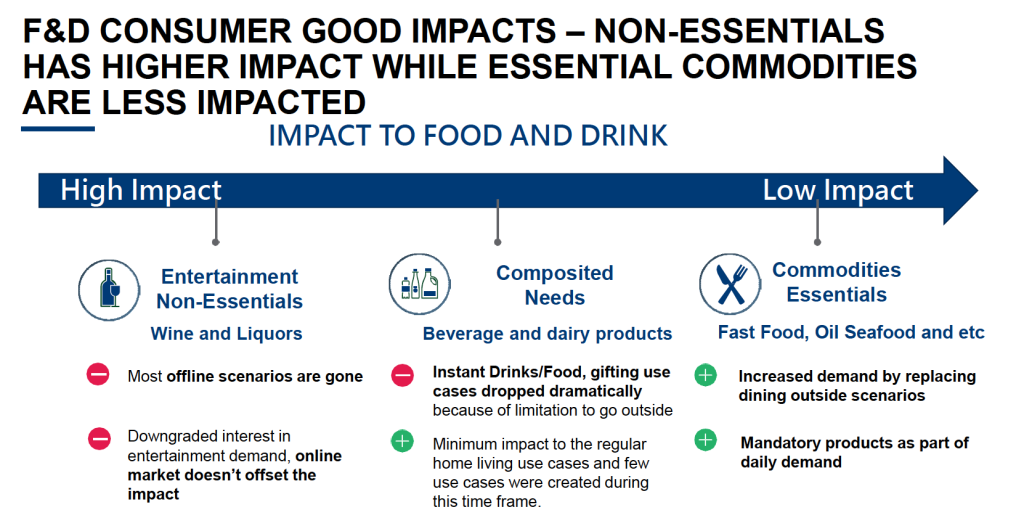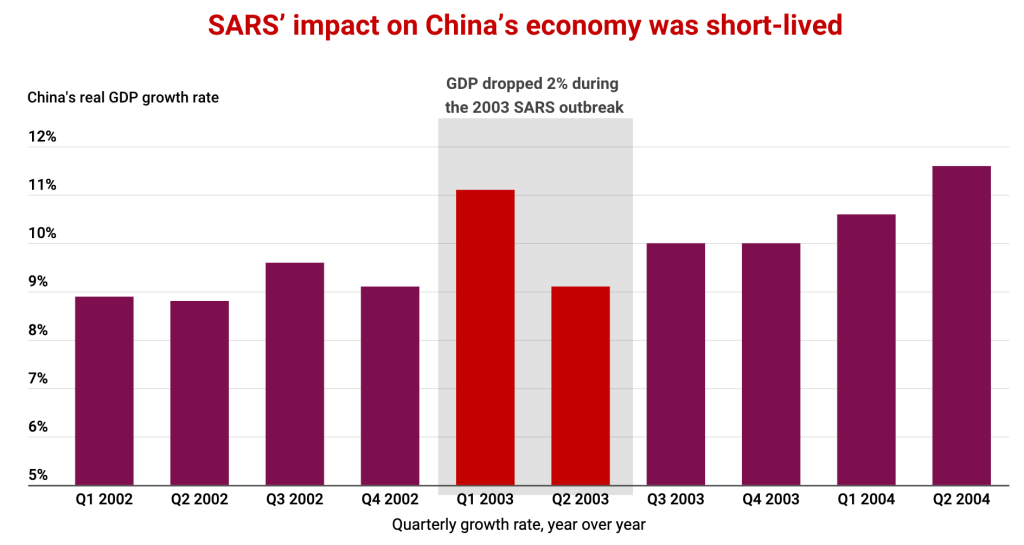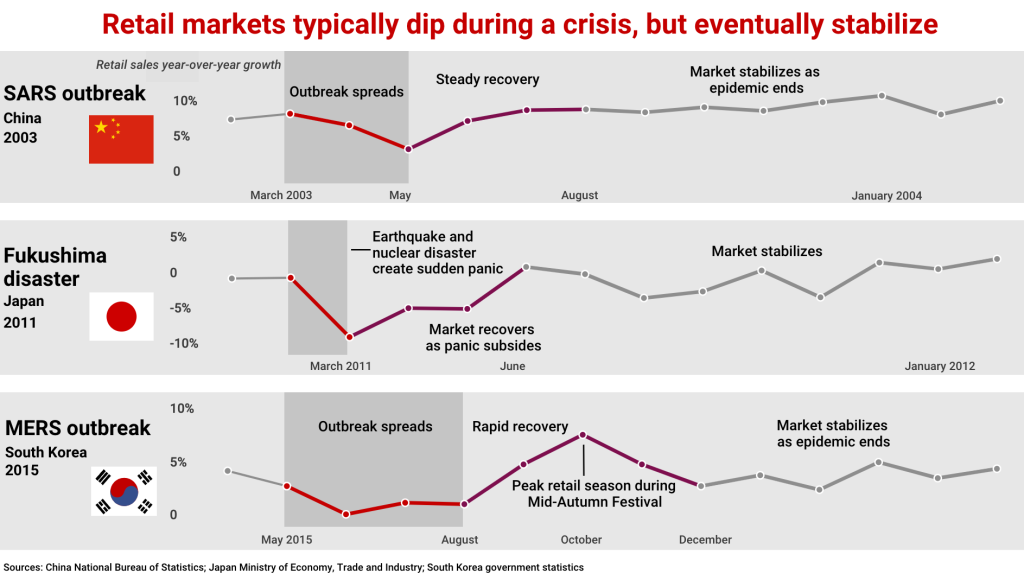The Coronavirus: Its Near-Term Impacts and Opportunities

The COVID-19 coronavirus is already having an impact on how business is conducted around the world. In light of the spread of the virus, businesses have plenty of questions, some of which can be addressed, others not. Here is what we can expect based on how the coronavirus has been affecting economies around the world:
- All Industries are being affected. If they have not been hurt already, they will be soon.
- Consumer goods is less affected and will recover soon. In fact, commodity goods are seeing an increase in demand.
- We’re seeing the rapid emergence of opportunities for online commerce to grow, especially with social commerce. Why? Because based on history, global crises cause a surge in people adopting online behaviors. And as the economy recovers from the impact of a crisis, businesses that quickly ramp up capabilities such as social commerce are well positioned for the rebound.
Let’s take a closer look.
Assessing the Impact
COVID-19 is now the world’s problem. Its spread is unfolding rapidly by the minute. The virus is disrupting all industries. However, we’ll start seeing a rebound soon, with consumer products and consumer electronics both showing signs of recovery in the second quarter of 2020.
Indeed there is hope on the horizon. But in the near term, disruption is the byword of the day. Nonessential products are being hit the hardest. Essential goods, less so:

Centific. All Rights Reserved
In fact, certain goods such as essential commodities have actually seen an uptick in sales volume.
In addition, the spread of COVID-19 has changed consumer behaviors dramatically, as people adopt more online behaviors including purchasing goods and services. We see a drop in offline sales and a surge in online sales, including ecommerce and online-to-offline (O2) home delivery. The comparison of offline and online commerce underscores a reality: there are winners and losers when a disruption occurs resulting from how people adapt their behaviors.
Lessons from Other Recent Disruptions
Of course, this is not the first time a coronavirus has affected global economies. In 2003, the SARS coronavirus menaced the world although not to the extent that the COVID-19 coronavirus is. But SARS did disrupt one of the world’s largest economies, China, where the gross domestic product dropped 2 percent. That said, the impact was short lived:

Bain Insights: https://www.bain.com/insights/beyond-the-coronavirus-crisis-prepare-now/
By the second quarter of 2004, China’s economy was stronger than before SARS hit. To be sure, SARS and COVID-19 are not perfectly parallel. Each outbreak is characterized by its own variables. But China’s fairly rapid economic recovery from SARS is instructive.
Since SARS happened, important global economies have been hurt by other disasters, including the Fukushima disaster in Japan (2011) and the MERS outbreak in South Korea (2015). When we look at SARS, the Fukushima disaster, and MERS side by side, a pattern emerges: retail markets take a hit – but then they stabilize.

Bain Insights. https://www.bain.com/insights/chinas-retailers-and-the-coronavirus-outbreak-lessons-from-the-past/
The turmoil caused by a disaster of any kind is stressful and can seem disheartening to anyone experiencing the worst of an economic downswing. It’s painful. But the turmoil gives way to stability and then growth. There is hope.
What Strategy Should Businesses Take?
Already most businesses expect to realign their go-to-market strategies around online commerce according to a Bain survey, which is understandable. But traditional ecommerce strategies are expensive and complicated. Optimizing ecommerce channels is good for a long term strategy, but difficult to improve over the short term. Social commerce is quicker and easier to execute to go to market. What specific strategies should they employ? Based on how China has been affected by COVID-19 already, we suggest:
Near-Term
Make sure your online presence is robust enough to handle an uptick in visits and transactions. This applies to every touchpoint from your website to your socials.
- Capitalize on the opportunity to win with social commerce. We don’t need COVID-19 to tell us how important social is now. Social commerce enjoys a higher conversion rate than traditional ecommerce, is enjoying a higher growth trajectory than ecommerce, Moreover, social commerce is easier for businesses to embrace quickly relative to ecommerce.
- Prepare for an increase in demand for online-to-offline (O2O) home delivery. Beef up your fulfilment capability now.
- Enable marketing automation to improve customer engagement and relationships. Why? Because once COVID-19 subsides, businesses will see a surge in customer demand, which cannot be done manually. Businesses that use the right marketing automation tools can be more agile in responding to a surge in demand using their own data and channels.
Longer Term
- Learn from the surge of online activity. How well prepared were you? What revisions do you need to make to your online/offline commerce and customer engagement strategies to be more adaptable?
Consider how the change affects your long-term strategy for going to market. Be ready to redesign your go-to-market strategy to incorporate a stronger online/offline approach. What ties these opportunities together is creating a more intelligent and agile customer experience based on a customer data platform that you can own through social commerce:
The One Thing You Need to Do Now
Without question, capitalizing on the rise of social commerce is paramount. A strong social commerce strategy is a quick and effective way to manage changing consumer behavior amid the growth of COVID-19 as well as the inevitable rebound that will occur soon. Social commerce was already on the rise before COVID-19 hit an inflection point. As more people turn to social to live, connect, and manage their lives, there will be no turning back after COVID-19 subsides.
At Centific, we know how to help businesses adopt technology to adapt to changing customer behaviors, applying marketing automation tools that allow you to control your customer data and gain insights from it. Contact us today.
